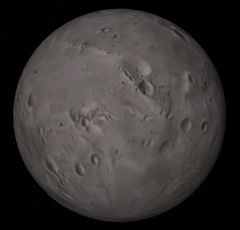Cressida
Cressida (Uranus IX, S/1986 U 3) is one of the inner satellites of Uranus. It was discovered by the Voyager2 spacecraft in January 1986. It is named after the Trojan daughter of Calchas in Shakespeare's Troilus and Cressida.
Portia in Orbiter[edit]
Cressida was first introduced into Orbiter with the add-on uranus.zip in November 2002.
| Add-on | Source | Version | Author | Type | Release Date | Compatibility | Wiki article |
|---|---|---|---|---|---|---|---|
| The Outer Planets 060929 Base | AVSIM | Rolf Keibel Carl Romanik Tony Dunn |
Scenery | 30 September 2006 | Orbiter 2006-P1 | ||
| The Outer Planets 050329 Update | AVSIM | 050329 | Rolf Keibel Tony Dunn Carl Romanik |
Scenery | 30 March 2005 | ||
| The Outer Planets 050125 | AVSIM | 050125 | Rolf Keibel Tony Dunn |
Scenery | 26 January 2005 | Orbiter 2005-P1 | |
| Uranus Minor Moons | O-F Resources | 2004-12-14 | Nighthawke | Scenery | 14 December 2004 | ||
| Uranus | AVSIM | Rolf Keibel | Scenery | 5 November 2002 | |||
Cressida imaged by the Voyager 2 spacecraft in 1986,
from Wikimedia Commons
| Uranus's natural satellites |
|---|
| Named Satellites:
Ariel | Belinda | Bianca | Caliban | Cordelia | Cressida | Cupid | Desdemona | Ferdinand | Francisco | Juliet | Mab | Margaret | Miranda | Oberon | Ophelia | Perdita | Portia | Prospero | Puck | Rosalind | Setebos | Stephano | Sycorax | Titania | Trinculo | Umbriel Numbered Satellites: |
| See also: Pronunciation key | rings of Uranus |
| edit The Solar System | |
|---|---|
| Central star |
Sun (Sol) |
| Planets |
Mercury - Venus - Earth - Mars - Jupiter - Saturn - Uranus - Neptune |
| Natural satellites |
Moon - Phobos - Deimos - Io - Europa - Ganymede - Titan - more... |
| Add-ons |
Planets - Dwarf Planets - Small objects - Natural satellites - Alternative star systems |
 | This natural satellite related article is a stub. You can help Orbiterwiki by expanding it.
|






